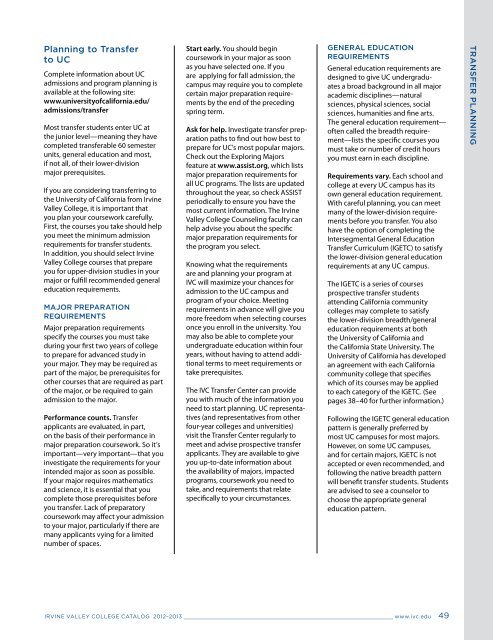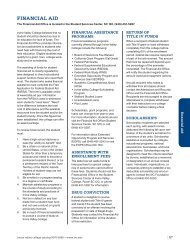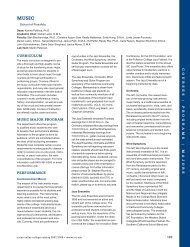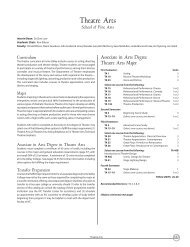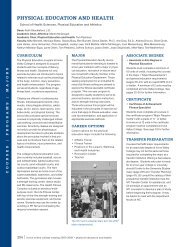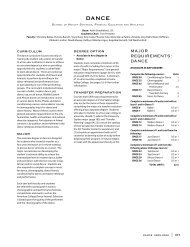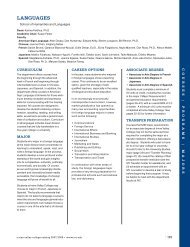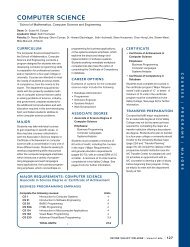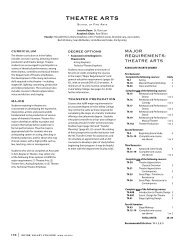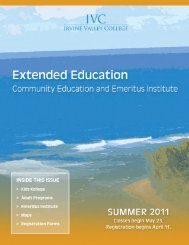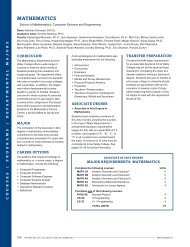Download - Irvine Valley College
Download - Irvine Valley College
Download - Irvine Valley College
Create successful ePaper yourself
Turn your PDF publications into a flip-book with our unique Google optimized e-Paper software.
DEGREES/ EMPHASIS<br />
Planning to Transfer<br />
to uc<br />
Complete information about UC<br />
admissions and program planning is<br />
available at the following site:<br />
www.universityofcalifornia.edu/<br />
admissions/transfer<br />
Most transfer students enter UC at<br />
the junior level—meaning they have<br />
completed transferable 60 semester<br />
units, general education and most,<br />
if not all, of their lower-division<br />
major prerequisites.<br />
If you are considering transferring to<br />
the University of California from <strong>Irvine</strong><br />
<strong>Valley</strong> <strong>College</strong>, it is important that<br />
you plan your coursework carefully.<br />
First, the courses you take should help<br />
you meet the minimum admission<br />
requirements for transfer students.<br />
In addition, you should select <strong>Irvine</strong><br />
<strong>Valley</strong> <strong>College</strong> courses that prepare<br />
you for upper-division studies in your<br />
major or fulfill recommended general<br />
education requirements.<br />
MAJOR preparatiON<br />
Requirements<br />
Major preparation requirements<br />
specify the courses you must take<br />
during your first two years of college<br />
to prepare for advanced study in<br />
your major. They may be required as<br />
part of the major, be prerequisites for<br />
other courses that are required as part<br />
of the major, or be required to gain<br />
admission to the major.<br />
Performance counts. Transfer<br />
applicants are evaluated, in part,<br />
on the basis of their performance in<br />
major preparation coursework. So it’s<br />
important—very important—that you<br />
investigate the requirements for your<br />
intended major as soon as possible.<br />
If your major requires mathematics<br />
and science, it is essential that you<br />
complete those prerequisites before<br />
you transfer. Lack of preparatory<br />
coursework may affect your admission<br />
to your major, particularly if there are<br />
many applicants vying for a limited<br />
number of spaces.<br />
Start early. You should begin<br />
coursework in your major as soon<br />
as you have selected one. If you<br />
are applying for fall admission, the<br />
campus may require you to complete<br />
certain major preparation requirements<br />
by the end of the preceding<br />
spring term.<br />
Ask for help. Investigate transfer preparation<br />
paths to find out how best to<br />
prepare for UC’s most popular majors.<br />
Check out the Exploring Majors<br />
feature at www.assist.org, which lists<br />
major preparation requirements for<br />
all UC programs. The lists are updated<br />
throughout the year, so check ASSIST<br />
periodically to ensure you have the<br />
most current information. The <strong>Irvine</strong><br />
<strong>Valley</strong> <strong>College</strong> Counseling faculty can<br />
help advise you about the specific<br />
major preparation requirements for<br />
the program you select.<br />
Knowing what the requirements<br />
are and planning your program at<br />
IVC will maximize your chances for<br />
admission to the UC campus and<br />
program of your choice. Meeting<br />
requirements in advance will give you<br />
more freedom when selecting courses<br />
once you enroll in the university. You<br />
may also be able to complete your<br />
undergraduate education within four<br />
years, without having to attend additional<br />
terms to meet requirements or<br />
take prerequisites.<br />
The IVC Transfer Center can provide<br />
you with much of the information you<br />
need to start planning. UC representatives<br />
(and representatives from other<br />
four-year colleges and universities)<br />
visit the Transfer Center regularly to<br />
meet and advise prospective transfer<br />
applicants. They are available to give<br />
you up-to-date information about<br />
the availability of majors, impacted<br />
programs, coursework you need to<br />
take, and requirements that relate<br />
specifically to your circumstances.<br />
General Education<br />
Requirements<br />
General education requirements are<br />
designed to give UC undergraduates<br />
a broad background in all major<br />
academic disciplines—natural<br />
sciences, physical sciences, social<br />
sciences, humanities and fine arts.<br />
The general education requirement—<br />
often called the breadth requirement—lists<br />
the specific courses you<br />
must take or number of credit hours<br />
you must earn in each discipline.<br />
Requirements vary. Each school and<br />
college at every UC campus has its<br />
own general education requirement.<br />
With careful planning, you can meet<br />
many of the lower-division requirements<br />
before you transfer. You also<br />
have the option of completing the<br />
Intersegmental General Education<br />
Transfer Curriculum (IGETC) to satisfy<br />
the lower-division general education<br />
requirements at any UC campus.<br />
The IGETC is a series of courses<br />
prospective transfer students<br />
attending California community<br />
colleges may complete to satisfy<br />
the lower-division breadth/general<br />
education requirements at both<br />
the University of California and<br />
the California State University. The<br />
University of California has developed<br />
an agreement with each California<br />
community college that specifies<br />
which of its courses may be applied<br />
to each category of the IGETC. (See<br />
pages 38–40 for further information.)<br />
Following the IGETC general education<br />
pattern is generally preferred by<br />
most UC campuses for most majors.<br />
However, on some UC campuses,<br />
and for certain majors, IGETC is not<br />
accepted or even recommended, and<br />
following the native breadth pattern<br />
will benefit transfer students. Students<br />
are advised to see a counselor to<br />
choose the appropriate general<br />
education pattern.<br />
TRANSFER planning<br />
<strong>Irvine</strong> <strong>Valley</strong> <strong>College</strong> Catalog 2012–2013________________________________________________________________ www.ivc.edu 49


